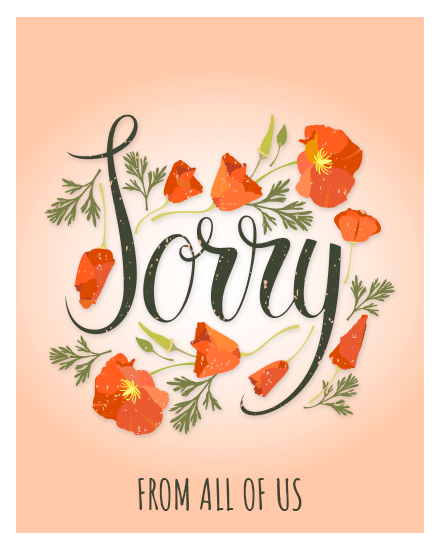Introduction
In the journey of relationships, misunderstandings, conflicts, and mistakes are bound to happen. However, what truly matters is how we choose to address these situations and mend the bonds that have been strained. Apologies play a vital role in restoring trust, healing wounds, and fostering reconciliation. While verbal apologies have their place, the use of Sorry card has emerged as a powerful and heartfelt way to express remorse and rebuild connections. In this article, we will explore the significance and power of sorry cards in the process of apology and reconciliation.
The Art of Apology
Apologies are not merely a formality but a sincere expression of regret and a willingness to make amends for the hurt caused. They provide an opportunity for individuals to take responsibility for their actions, acknowledge the pain they have inflicted, and seek forgiveness. Crafting a genuine apology requires careful thought, empathy, and the ability to understand the perspective of the person who has been wronged.
The Power of Sorry Cards
While spoken apologies can be heartfelt, they are often fleeting moments that fade from memory over time. This is where sorry cards come into play, as they have the power to transcend time and create a lasting impact. Here's why sorry cards are so effective:
Tangible Expression of Remorse:
Sorry cards offer a physical representation of remorse, allowing the sender to convey their regret in a thoughtful and personal manner. The act of creating or choosing a card itself demonstrates the effort invested in making amends, which can resonate deeply with the recipient.
Thoughtful and Deliberate Communication:
Crafting a sorry card requires time and consideration. It offers an opportunity to carefully select words, metaphors, and images that best convey the emotions involved. This thoughtful approach adds depth and sincerity to the apology, making it more meaningful.
Emotional Connection:
Sorry cards can evoke powerful emotions in both the sender and recipient. They can act as a conduit for empathy and understanding, allowing the sender to express their remorse while enabling the recipient to feel heard and validated. The act of receiving a card can provide solace and reassurance that their pain has been acknowledged.
Preservation of Memories:
Unlike verbal apologies that can fade with time, sorry cards serve as tangible reminders of the path to healing. They can be kept as mementos, serving as a symbol of growth, forgiveness, and the resilience of relationships. In times of doubt or future conflicts, sorry cards can be revisited to reinforce the commitment to reconciliation.
Best Practices for Sorry Cards
To ensure sorry cards are effective in the process of apology and reconciliation, here are some best practices to consider:
Personalization: Tailor the message of the sorry card to the specific situation and the recipient. Use their name, refer to the incident, and express genuine remorse. This personal touch demonstrates that the apology is not generic but specifically addressed to the person affected.
Authenticity: Be sincere and genuine in your apology. Avoid generic or clichéd phrases. Instead, express your emotions honestly, take responsibility for your actions, and show a willingness to make amends.
Empathy and Understanding: Seek to understand the emotions and perspective of the person you are apologizing to. Acknowledge their pain and demonstrate empathy. Use words that convey compassion and a genuine desire to repair the relationship.
Creativity: Use creativity to make the sorry card visually appealing and memorable. Incorporate elements such as illustrations, photographs, or handwritten notes to add a personal touch. The visual representation can enhance the emotional impact of the apology.
Non-Verbal Communication: Sorry cards offer a unique form of non-verbal communication, allowing individuals to express their remorse without the pressure of immediate face-to-face interaction. This can be particularly beneficial in situations where emotions are running high or when distance or time constraints make it challenging to apologize in person.
Healing for the Sender: Crafting a sorry card can be a cathartic process for the individual offering the apology. It provides an opportunity for self-reflection, introspection, and personal growth. By taking the time to articulate their regret and empathy through the sorry card, the sender can experience a sense of closure and emotional healing.
Rebuilding Trust: Trust is a fragile element in relationships, and apologies are crucial in rebuilding it. Sorry cards can play a significant role in this process by showcasing the sender's commitment to making amends. The tangible nature of sorry cards can serve as a visible reminder of the apology, acting as a foundation for rebuilding trust and moving forward.
Resolving Communication Barriers: In some cases, verbal apologies may be challenging due to communication barriers, such as language differences, emotional barriers, or discomfort with face-to-face interactions. Sorry cards provide an alternative means of expressing remorse, allowing individuals to overcome these barriers and initiate the process of reconciliation.
Extended Reach and Impact: Sorry cards have the potential to reach a broader audience compared to verbal apologies. They can be shared with family, friends, or colleagues who may have been affected by the situation indirectly. This extended reach allows apologies to be heartfelt and inclusive, fostering a sense of collective healing and strengthening the fabric of relationships within a larger circle.
Teaching Tool for Children: Sorry cards can be especially valuable when teaching children about the importance of apologies and reconciliation. By involving them in the creation or selection of sorry cards, children learn about empathy, taking responsibility for their actions, and the power of making amends. Sorry cards offer a tangible way for children to express their remorse and learn the value of repairing relationships.
Funny Birthday Cards
Funny Birthday Cards can be a simple but effective way to show appreciation for colleagues. They don't have to be elaborate or expensive, but they can go a long way in making someone feel valued and appreciated. Birthday cards can also be a way to celebrate milestones within the office. For example, if an employee is celebrating a milestone birthday, it can be a way to acknowledge their contributions to the company over the years.
Conclusion
Apology cards are essential in repairing relationships, and sorry cards have proven to be a powerful tool in the process of apology and reconciliation. They provide a tangible and lasting expression of remorse, fostering emotional connection and preserving memories. The art of crafting a sorry card allows individuals to communicate their regret in a thoughtful and deliberate manner. By following best practices and infusing apologies with authenticity, empathy, and creativity, sorry cards can truly mend hearts and pave the way for healing and reconciliation in both personal and professional relationships.



